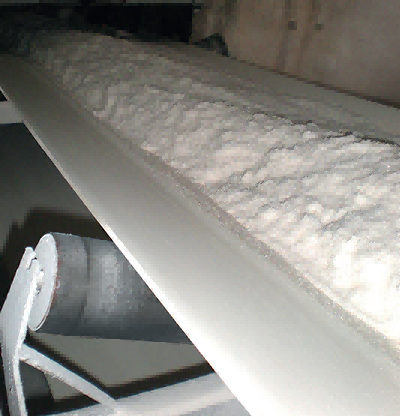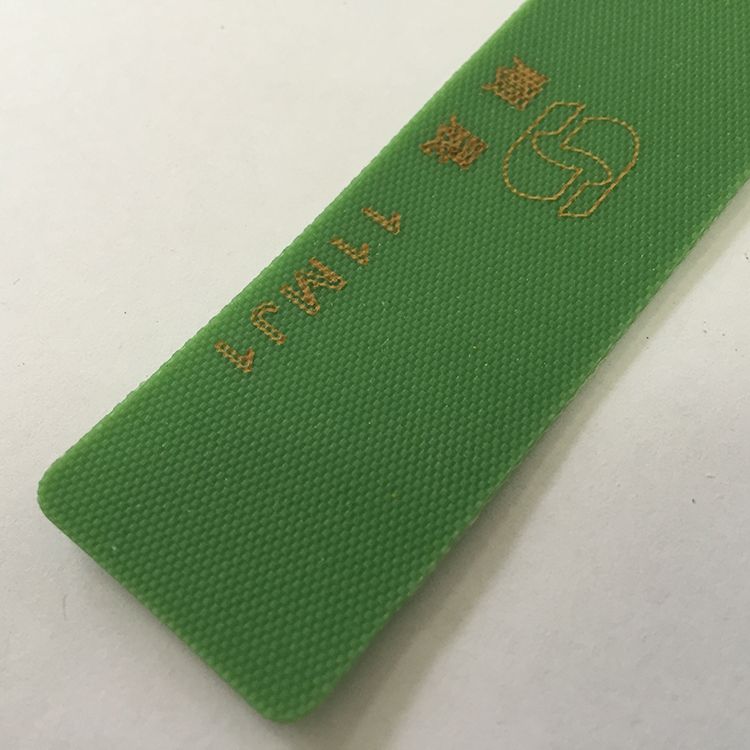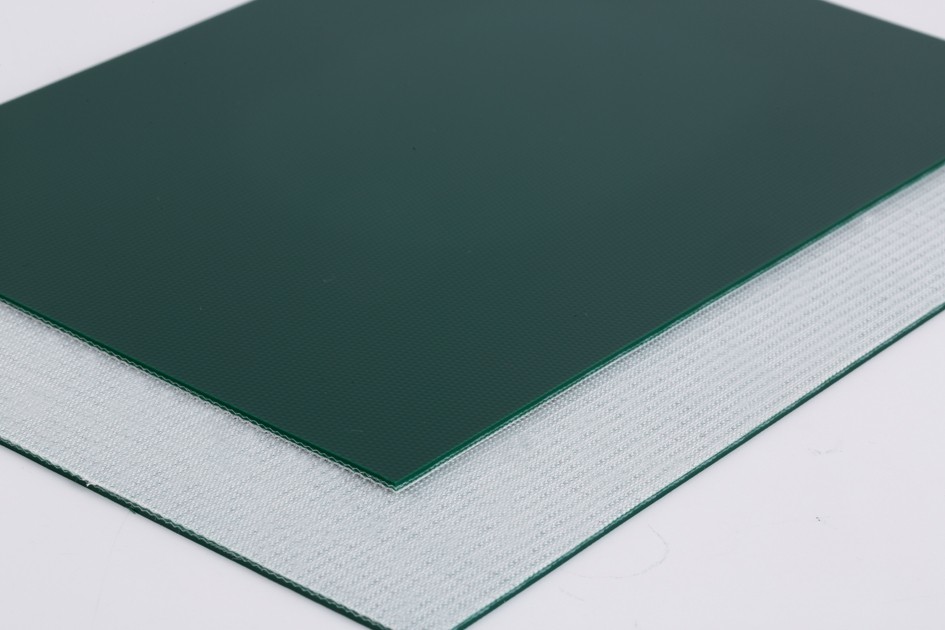Introduction
Solid woven conveyor belts are essential components in various industries, providing efficient transportation of materials. However, selecting the right manufacturer is crucial to ensure optimal performance, durability, and safety. In this comprehensive guide, we will explore the key features to consider when choosing a solid woven conveyor belt manufacturer.

Quality and Durability
Quality and durability are paramount considerations when selecting a solid woven conveyor belt manufacturer. The reliability and longevity of the conveyor belts directly correlate with the materials used, the manufacturing processes employed, and the rigorous quality control measures implemented throughout production.
- Materials Selection
Solid woven conveyor belts are typically constructed using a combination of high-quality materials such as polyester, nylon, or steel cords. These materials offer exceptional tensile strength, resistance to abrasion, and durability, making them suitable for various industrial applications.
Polyester and nylon fabrics are commonly used as the base material for solid woven conveyor belts due to their excellent tear resistance and flexibility. These fabrics provide the foundation for the belt, ensuring stability and reliability during operation.
In addition to fabric materials, steel cords are often incorporated into the belt design to enhance strength and durability, especially in applications where heavy loads or high tension are involved. Steel cord reinforcement increases the overall tensile strength of the belt, making it capable of withstanding extreme conditions and prolonged use.
When evaluating manufacturers, inquire about the specific materials used in their conveyor belts and ensure they meet industry standards for quality and performance. Manufacturers who prioritize the use of premium-grade materials are more likely to produce conveyor belts that offer superior durability and longevity.
- Manufacturing Processes
The manufacturing process plays a crucial role in determining the quality and durability of solid woven conveyor belts. Advanced weaving techniques, precision engineering, and meticulous attention to detail are essential for producing belts that meet stringent performance standards.
Modern manufacturing facilities are equipped with state-of-the-art machinery and technology to ensure consistency and accuracy throughout the production process. Automated weaving looms, computer-controlled tensioning systems, and quality control systems are employed to maintain the highest levels of quality and efficiency.
Each step of the manufacturing process, from weaving the fabric to applying coatings and adhesives, must be carefully executed to ensure optimal performance and durability. Quality checks and inspections are conducted at various stages to identify any defects or imperfections and address them promptly.
Manufacturers who invest in advanced manufacturing processes and adhere to strict quality control protocols are better equipped to produce solid woven conveyor belts that offer exceptional durability, reliability, and performance.
- Testing and Quality Control Procedures
Stringent testing and quality control procedures are essential for ensuring the reliability and performance of solid woven conveyor belts. Manufacturers conduct comprehensive testing to evaluate various properties such as tensile strength, elongation, abrasion resistance, and adhesion strength.
Laboratory testing is performed on samples of conveyor belts to assess their mechanical properties and performance characteristics under simulated operating conditions. Tensile tests, abrasion tests, and fatigue tests are conducted to verify the strength and durability of the belts.
In addition to laboratory testing, manufacturers also perform field tests to evaluate the performance of conveyor belts in real-world applications. Field tests allow manufacturers to assess factors such as belt tracking, splicing integrity, and overall performance under actual operating conditions.
Customization Options
Every industry and application has unique requirements when it comes to conveyor belts. Therefore, it’s essential to choose a manufacturer that offers a wide range of customization options to tailor belts to specific needs.
Consider factors such as belt width, length, and thickness when evaluating manufacturers. A reputable manufacturer should be able to accommodate various belt sizes and configurations to suit different applications.
Furthermore, inquire about additional features and accessories that may enhance the performance of the conveyor belts. This could include specialized coatings for increased durability, cleats for inclined conveying, or sidewalls for containing materials.
Industry Experience and Reputation
Industry experience and reputation are fundamental aspects to consider when selecting a solid woven conveyor belt manufacturer. The manufacturer’s track record, longevity in the industry, and the relationships they’ve built over time are indicative of their expertise, reliability, and ability to deliver quality products and services.
- Length of Time in Business
The duration a manufacturer has been operating in the industry is a key indicator of their stability and expertise. Companies with decades of experience have likely weathered various market conditions, technological advancements, and industry challenges. Their longevity speaks to their ability to adapt, innovate, and consistently meet the needs of their customers.
Manufacturers with a long history in the industry have likely honed their craft, perfected their processes, and amassed a wealth of knowledge and expertise. They understand the nuances of conveyor belt manufacturing, as well as the unique requirements of different industries and applications. Their experience enables them to offer valuable insights, guidance, and solutions to customers.
When evaluating manufacturers, consider their years in business and assess whether they have a proven track record of success and longevity. Manufacturers with a rich history and extensive industry experience are better positioned to deliver high-quality products and exceptional service.
- Track Record of Success
A manufacturer’s track record of success is a reflection of their commitment to excellence, customer satisfaction, and continuous improvement. Look for manufacturers with a history of delivering reliable, durable, and high-performance conveyor belts that meet or exceed customer expectations.
Customer testimonials, case studies, and references are valuable resources for assessing a manufacturer’s track record. Positive feedback from satisfied customers is a strong endorsement of a manufacturer’s quality, reliability, and professionalism. Conversely, negative reviews or complaints may indicate potential issues with product quality, service, or reliability.
Additionally, consider any notable achievements, awards, or certifications that the manufacturer has earned. Recognitions from industry organizations or regulatory bodies are a testament to a manufacturer’s dedication to quality, compliance, and excellence.
- Customer Testimonials and Reviews
Customer testimonials and reviews provide valuable insights into a manufacturer’s reputation, customer satisfaction, and overall performance. Reading testimonials from past and current customers can offer firsthand accounts of their experiences working with the manufacturer.
Pay attention to factors such as responsiveness, communication, product quality, and after-sales support mentioned in customer testimonials. Positive testimonials highlighting prompt service, high-quality products, and excellent support are indicators of a reputable manufacturer.
In addition to testimonials, online reviews and ratings on platforms such as Google, Yelp, or industry-specific forums can offer additional perspectives from a broader audience. While individual reviews should be considered in context, patterns of positive or negative feedback can provide valuable insights into a manufacturer’s reputation and performance.
Technical Support and After-Sales Service
Technical support and after-sales service are critical aspects to consider when selecting a solid woven conveyor belt manufacturer. Comprehensive support throughout the entire lifecycle of the product ensures smooth operation, optimal performance, and maximum uptime for your conveyor system.
- Availability of Technical Expertise
Choose a manufacturer that offers readily available technical expertise to assist with installation, maintenance, troubleshooting, and optimization of your conveyor belts. Access to knowledgeable and experienced technicians can help address any technical issues or challenges that arise during the lifecycle of the belts.
Manufacturers with dedicated technical support teams or field service engineers can provide valuable guidance and assistance tailored to your specific needs and requirements. Whether you need assistance with belt installation, splicing, alignment, or troubleshooting conveyor system issues, having access to expert support can minimize downtime and maximize productivity.
- Responsiveness to Inquiries and Support Requests
Evaluate the manufacturer’s responsiveness to inquiries and support requests to ensure timely assistance when needed. A manufacturer that prioritizes customer service and responsiveness demonstrates a commitment to customer satisfaction and support.
Choose a manufacturer that offers multiple channels of communication, such as phone, email, live chat, or online support portals, to facilitate quick and efficient communication. The ability to reach technical support representatives promptly and receive timely assistance can significantly impact the reliability and performance of your conveyor system.
Furthermore, inquire about the manufacturer’s average response times for support requests and their process for handling urgent or critical issues. Manufacturers that prioritize rapid response times and have established protocols for addressing emergency situations can help minimize disruptions and ensure continuity of operations.
- Warranty and Service Agreements
Review the manufacturer’s warranty and service agreements to understand the level of support and protection provided for your conveyor belts. A comprehensive warranty ensures peace of mind and protects against defects in materials or workmanship during the warranty period.
In addition to warranty coverage, consider the availability of extended service agreements or maintenance contracts offered by the manufacturer. These agreements may include preventive maintenance services, routine inspections, and priority support to help prolong the lifespan of your conveyor belts and maximize their performance.
When evaluating warranty and service agreements, pay attention to coverage terms, exclusions, limitations, and renewal options. Choose a manufacturer that offers transparent and flexible warranty and service agreements tailored to your specific needs and budget.
Environmental and Safety Considerations
In today’s environmentally conscious world, it’s important to choose a manufacturer that prioritizes sustainability and safety. Look for manufacturers that adhere to strict environmental regulations and employ eco-friendly manufacturing practices.
Furthermore, consider the safety features and certifications offered by the manufacturer. Solid woven conveyor belts are often used in hazardous environments, so it’s essential that they meet stringent safety standards to protect workers and prevent accidents.
Pricing and Value Proposition
While pricing is undoubtedly a significant factor in the decision-making process, it’s essential to consider the overall value proposition offered by the manufacturer. A lower upfront cost may be tempting, but it’s crucial to assess the quality, durability, and support provided to determine long-term value.
Request quotes from multiple manufacturers and compare pricing structures. However, don’t solely base your decision on price alone. Consider factors such as quality, customization options, technical support, and reputation when evaluating the overall value proposition.
Conclusion
Selecting the right solid woven conveyor belt manufacturer requires careful consideration of various factors, including quality, customization options, industry experience, technical support, environmental considerations, and pricing. By thoroughly researching and evaluating potential manufacturers based on these key features, you can ensure that you choose a reliable partner capable of meeting your needs and exceeding your expectations.





